THE American WESTERN
By Jeffrey-Baptiste Tarlofsky
By Jeffrey-Baptiste Tarlofsky
Lesson 11 consists of four video lectures and transcripts of those lectures, and four film excerpts. Start with excerpt #1 from Red River and continue down the page in sequence until you reach the end of the lesson.
レッスン11は4本のビデオレクチャー(レクチャーのテキストがビデオレクチャーの下に記載されています)と4 本の動画で構成されています。
このレッスンは、ページをスクロールダウンしながら最初から順番に動画を見たりテキストを読んでください。
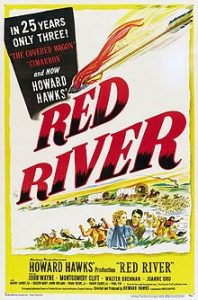
Directed & produced by: Howard Hawks
Screen play by: Borden Chase
Starring: John Wayne, Montgomery Clift, Walter Brennan, Joanne Dru
Music by: Dimitri Tiomkin
Distributed by: United Artists
Running time: 133 minutes (Pre-release) 127 minutes (Theatrical)
Budget: $2.7 million
Box office: $9,012,000
Part 1 – We start with Tom and Matt looking over their herd and Tom saying “They say we can’t make the drive”, but Matt expresses his confidence by saying, “they could be wrong”, and he hands the cigarette he has just lit to Tom. This is a perfect “Matt moment” because this is what he is like throughout the movie. He is always lighting Tom’s cigarettes, doing the hard jobs Tom gives him, and eventually cleaning up Tom’s messes. Matt is the one with that quiet confidence in himself that inspires those around him to follow him. Throughout the film you will never hear Matt threaten, bully or insult anyone. In fact, you will never hear Matt raise his voice in anger. This is why Tom has given Matt the all-important job of “Trail Boss”. The Trail Boss was the leader of the cattle drive, in charge of all the men and equipment as well as choosing the route. The Trail Boss rode at the head of the herd, “on point”. This is why Dunson tells him “take them to Missouri, Matt” and Matt gives the first cowboy yell. Matt is supposed to be the one in charge.
Why talk about age? I do think the age differences between the characters are significant. The age differences between the three of them almost gives us three generations of a “family”. Although Groot is only fourteen years older than Dunson and therefore not quite old enough to be his father, Dunson is quite old enough to be Matt’s father. But there are other very interesting interpretations of the age differences which I will discuss later. For now, just keep their ages in mind.
Another thing to keep in mind, or in sight, is that bracelet. It has moved again. First Tom gave it to his girlfriend in what was all but a proposal of marriage, next we saw it on the wrist of the Comanche warrior who probably murdered Tom’s fiancée to get it, and then it went back to Tom after he kills the warrior.
Pause…
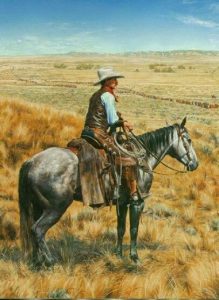
Trail boss taking a break from the cattle drive.
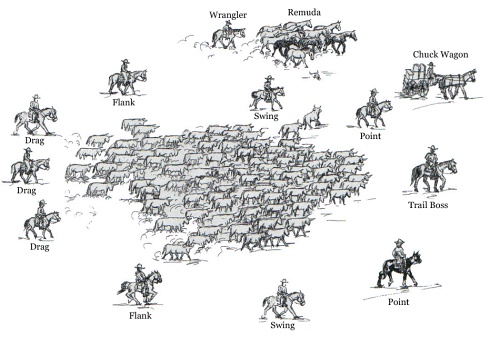
The cattle drive formation.
Some days into the drive, the men are relaxing after work and someone asks Cherry why he joined the drive. Cherry answers that he joined, “…because Matt turned me down…made me want to go” and he insolently adds, “Besides, I’ve taken a liking to that gun of his!” Groot snorts, “Fat chance you have of getting that, Bub!”
But this scene reminds us again of the rivalry between these two very dangerous young gunslingers. Suddenly the conversation becomes serious when Matt reminds them all that the situation at home is desperate. If they can’t make the cattle drive, the entire economy of Texas may not survive. People may starve! But Cherry then asks, if the drive is so important, why they are taking the difficult way to Missouri when there is an easier way to Kansas? Tom questions Cherry about whether there is a railroad in Abilene, but Cherry cannot say for certain. Tom isn’t interested in more discussion and says “I’ll sell my beef in Missouri” and when Groot tries to speak Tom rudely interrupts him and says he didn’t ask for his opinion. Groot answers “No, you didn’t, Mr. Dunson”.
What is wrong with this? After all, it is Tom’s herd and he is the boss, right? Except that we remember that at the beginning of the film Tom and Groot were equal partners and called each other by their first names. Groot still calls him “Tom” most of the time, but he calls him “Mr. Dunson” when Tom is acting like “the boss”. By the way, this is a clear example of how more formal language creates distance between speakers. By calling him “Mr. Dunson”, Groot is not only creating distance (or really acknowledging that Tom has put distance between them by telling him he didn’t ask for his opinion), but he is also showing his disapproval. This is something parents do with children and teachers do with students. If your Mother always calls you “Tom” and suddenly calls you “Thomas” you know you are in trouble. If your teacher has called you “Jeffrey” and suddenly says “Mr. Tarlofsky!”, you know you are in trouble. I was such a little brat when I was ten years old that when the teacher called me “Mr. Tarlofsky” I said, “My friends call me Jeffrey, but in your case, you can call me Mr. Tarlofsky”. I was being an insolent brat! But, I was also showing that I was aware of the socio-linguistic game she was playing and I could play the game better than she could. She really hated me after that, though.
Part 2 – When we talked about Stagecoach I said that the three-day journey gave some of the characters an opportunity to seek redemption while they were on the journey. The struggles they faced gave them a chance to redeem themselves. The best came out of Doc and Dallas and Hatfield while on the journey. But in Red River, almost the exact opposite happens with Thomas Dunson. The challenges of the long journey bring out all his worst qualities; his stubbornness, his bullying, his inability to listen to others or respect their opinions or feelings. Matt is supposed to be in charge because he is the trail boss, but Dunson constantly undermines and contradicts him, even interrupting Matt as he tries to explain what he thinks by saying, “I’ll do the thinking”.
We see that Dunson denies the men any time off for even something as simple as taking a bath. But it must be said that while he drives his men hard, he drives himself still harder.
What changes everything on the cattle drive, however, is the stampede caused by the sugar stealing cowboy, Bob Canale (not Kennedy). We have twice seen Groot scold this man for stealing sugar, but the third time he does it he accidentally knocks over the pots and pans causing the cattle to panic and stampede.
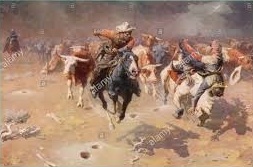
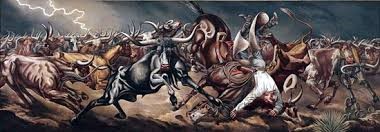
Of all the dangers and inconveniences cowboys faced on a cattle drive, the stampede was probably the worst. Stampedes usually happened at night and they often happened for no apparent reason. Cattle that were over tired, hungry or thirsty were more likely to stampede. Thunderstorms could easily trigger a stampede or, as we see in the film, a sudden noise. The way the cowboys stopped the stampede was to ride as fast as they could to the animals leading the stampede and shoot at their feet to try to force them to turn. They would continue to fire their guns in order to turn the lead cattle. Eventually they would get the whole herd turning in a huge circle and this would eventually bring them to a stop as they became too tired to run. Turning the herd into a circle also kept the herd from running off a cliff or into a river where they might drown.
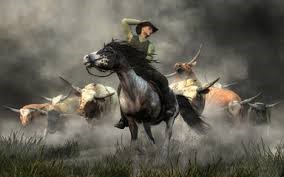
Cowboys could easily be killed in a stampede and in our film we see the singing cowboy, Dan, is killed. This cowboy was played by the actor Harry Carey Jr. who was also one of John Ford’s stock company. Two years after this small part in Red River he would be the co-star of Ford’s Wagon Master. Carey had a youthful innocence that seemed perfect for him to play the part of a young cowboy whose dream was to buy a pair of red shoes for his wife. After his body is found, Dunson is obviously moved and tells Matt to make sure his widow gets the full pay her husband would have earned for the drive and “anything else you can think of”. “Like a pair of red shoes?” asks Matt. This exchange between the two of them teaches us a great deal about both men.
Dunson is deeply affected by Dan’s death, but he cannot show his emotions or his sentimentality. A western man was not supposed to show emotions like grief, compassion or sadness (although he might certainly act on those emotions). On the other hand, Matt expresses the sentiment Tom cannot express. This is the difference between the two men.
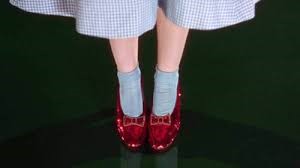
Part 3 – While Dunson was moved to compassion for Dan’s widow, he is furious about Dan’s senseless death. He should be! The cowboy Bob Canale is responsible for the stampede that killed Dan. And he caused the stampede because of his childish habit of stealing sugar.
He should certainly be punished for this. But what should the punishment be? Remember that Dunson is his employer. What right does an employer have over his employees? The strictest punishment would be to fire the man from his job without payment.
But Dunson says that because Canale has stolen sugar “like a kid”, he will punish him as a child would be punished, by whipping. I already explained that whipping was the usual punishment for boys who got into trouble. But whipping was considered a disgraceful punishment for an adult man.
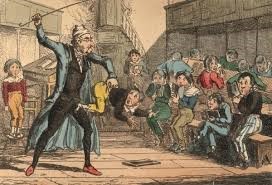
In Wagon Master, Elder Wiggs ordered Reece Cleggs whipped for trying to rape the Navajo woman. He felt this was a just punishment but it was also to avoid a fight with the Navajo who outnumbered and outgunned the Cleggs. By doing so he probably saved Reece’s life and perhaps many more, but the whipping humiliated Reece and was an insult to his honor. This was why his uncle planned to kill Elder Wiggs and destroy the Mormon’s grain wagon. Taking a man’s honor was almost the worst thing you could do to him.
When Thomas Dunson says he is going to whip Bob Canale, he is doing it in order to humiliate Bob by treating him like a schoolboy in front of all the other men. Perhaps the punishment does fit the crime, but any western man, and especially any cowboy will fight for his honor even if it means dying for it. This is why Canale refuses to be whipped and prepares to draw his gun. He is terrified, but he has to protect his honor.
It is possible that Tom really did start out with the intention of just whipping Canale, but he allowed the situation to become far more dangerous than it should have been. What is really disturbing about this is that Dunson may possibly have created this situation deliberately. Dunson cannot simply shoot Canale for knocking over some pots and pans, but he can kill him if he tries to draw his gun. This was a firm law in the West. If someone draws on you, you have the right to defend yourself with deadly force (kill them). Of course, it is suicide for a simple cowboy like Canale to draw on a gunslinger like Dunson, but Dunson has given him a choice between defending his honor or losing it. Canale is on the verge of trying to defend his honor when Matt suddenly shoots him. By shooting Canale, Matt actually saved his life….and everyone knows it. Canale even says “Thanks, Matt. He would have killed me!” Indeed, he would have.
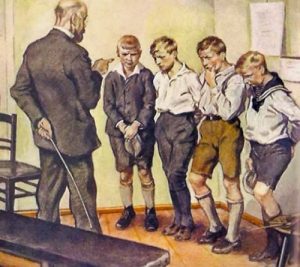
Even Dunson himself seems confused by what happened and he tells Groot to “Say it”. Groot says it.
‘You was (were) wrong, Mr. Dunson”.
Cherry, however, notes how fast Matt was with his gun, but he also notes that Matt’s “soft heartedness” might get him killed someday . Matt tells Cherry he shouldn’t count on it. Matt is really suggesting, of course, that if he and Cherry do end up fighting, Matt won’t hesitate to shoot to kill. In a weird way, I think that must make Cherry very happy.
Part 4 – The cattle stampede destroyed one of the supply wagons so they are short of food, but more importantly they are short of coffee! Groot has been mixing in roast grain with the coffee which makes it taste terrible, but more importantly it does not have the caffeine all the cowboys are addicted to. Caffeine is actually a highly addictive drug! When I was a university student, I was a coffee addict and if I couldn’t get my coffee in the morning or late afternoon I couldn’t study and became very irritable. I am thankful I am no longer a coffee addict! The average cowboy drank between eight and ten cups of coffee a day and suddenly going without the caffeine jolt the coffee provided would have left them experiencing withdrawal symptoms such as increased irritability and quickness to anger. It is a dangerous situation. The first time a cowboy shows anger to Tom is about the coffee!
The man who escaped from the Missouri border gang tells them that his trail boss should not have tried to go to Missouri because there is an easier way through Indian country and straight into Kansas which would be a shorter and safer trip. But again, Dunson won’t listen to anyone else’s opinion and he tells the men he has decided they will continue on to Missouri.
Three men object to this and announce that they will not continue to work unless Dunson changes the destination to Kansas. Dunson then points out that the men signed a contract and the contract clearly states that they are required to finish the cattle drive. He says he intends to hold them to the contract.
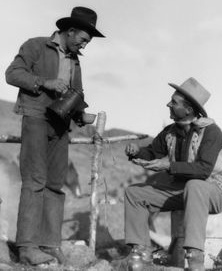
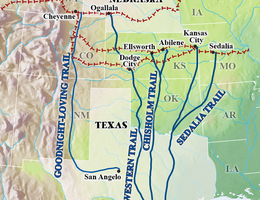
Let’s discuss this. What Dunson had the men sign was a labor contract; that is, a contract between an employer and employees. These contracts work two ways. They set out the conditions that the employees must meet to fulfill the contract, but they also set out the conditions that the employer must meet. In other words, the contract binds both parties to the conditions in the contract. What happens if one party or the other fails to meet the conditions of the contract? First of all, if one party fails to meet their contractual obligations, the other party is no longer strictly bound to the conditions of the contract, either. So, for example, if Dunson agreed to pay the men every week and does not actually do so, he would be in breech of the contract and the men would not have to continue to work. That wasn’t the case. The contract stated that the men would only be paid if the herd made it to market and was sold. What this means is that the mens’ wages depend on the success of the project. And what this means is that they have just as much a stake in the success of the cattle drive as Dunson.
First of all, if one party fails to meet their contractual obligations, the other party is no longer strictly bound to the conditions of the contract, either. So, for example, if Dunson agreed to pay the men every week and does not actually do so, he would be in breech of the contract and the men would not have to continue to work. That wasn’t the case. The contract stated that the men would only be paid if the herd made it to market and was sold. What this means is that the mens’ wages depend on the success of the project. And what this means is that they have just as much a stake in the success of the cattle drive as Dunson.
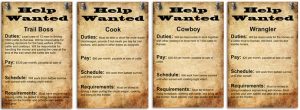
The contract would most likely also have stated that Dunson or his trail boss have the right to assign the men different jobs as they saw fit and the men would be required to obey their orders. However, there are certain implicit assumptions in the contract. One would be that since both parties have a stake in the outcome of the project, management, (the employer, Dunson ) would practice all “due diligence” in achieving that goal. In other words, willful mismanagement would violate the implicit terms of the contract. Moreover, while the men agreed in the contract to obey the orders of their employer, there is a clear limit to what an employer can order an employee to do. In the military, an officer may order his soldiers to risk their lives. But a labor contract does not give an employer the right to ask employees to risk their lives…and certainly not in an unreasonable way.
When the three cowboys say they will not continue the drive unless Dunson changes direction and heads for Kansas they are exercising their right to object: 1) to the mismanagement of the cattle drive under Dunson, and 2) to the unreasonable orders he is giving them to put their lives at risk by continuing on to Missouri.
When the men make their demands of Dunson they are essentially insisting on their rights as workers and the actual working conditions implied in the contract. However, Dunson insists that there can be no negotiation and that he is the only one permitted to interpret or enforce the terms of the contract. He then says to one of the men “I don’t want to kill you, Naylor” and the man simply replies “but what?”…and Dunson, Cherry and Matt kill all three men .
These killings are very close to the killing of the Mexican guard fifteen years earlier. In that situation the man had also insisted on the legal rights of his employer (Don Diego), but Dunson’s answer to his argument was to kill him. His answer to the three men demanding their legal rights is also to kill them. I would also point out that these killings are not done passionately. In both cases, Thomas Dunson kills without any excitement or passion. He kills for land the first time, he kills the second time because the men refuse to serve his business interests. In other words, Thomas Dunson kills for financial gain.
I think it is also fair to point out that the men who were killed were just ordinary cowboys, but Dunson, Matt and Cherry are all gunslingers. It would be hard to imagine a less fair fight than three cowboys facing three gunslingers.
This time Groot says it would be pointless to say anything to Dunson because he wouldn’t listen anyway. But the more serious rift seems to be with Matt. Matt tells Dunson directly that he is responsible for what happened. He says that he will still take Dunson’s orders, but Dunson can’t tell him what to think. This suggests to us that Matt may just be starting to think about not taking Dunson’s orders much longer.